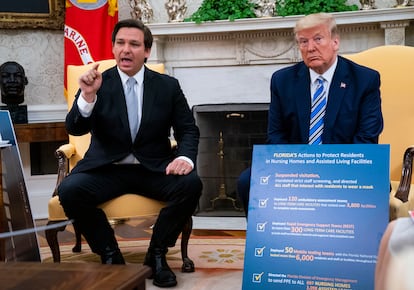Ron DeSantis: Trump’s worst nightmare
The governor of Florida – recently re-elected by a landslide – is looking to take over the Republican Party. But can he play at the national level?


When Ron DeSantis played Little League baseball in school, he would tell his teammates that, one day, he’d be president of the United States.
All these years later, the brag of a young man doesn’t seem so impossible.
Amidst a sea of disappointment for the Republican Party in the 2022 midterm elections, Governor Ron DeSantis of Florida was an island of stability. He crushed his Democratic rival – former Florida governor Charlie Crist – by a 20-point margin in his re-election bid. He won a supermajority in the state legislature, while at the federal level, his allies picked up four House seats in tough congressional districts across Florida.
From Little League championships to Yale University to Congress to the Governor’s Mansion in Tallahassee – all by the age of 44 – it doesn’t seem like anything or anyone can stop DeSantis. And that’s a big worry for his political mentor: Donald J. Trump.
Unlike Trump, DeSantis has not yet officially announced his candidacy for the 2024 Republican presidential nomination, although he’s been sitting down with big donors every weekend. Many analysts think he’s a shoe-in – he’s Donald Trump without the baggage or the extra decades. However, some political observers are a bit more cautious. DeSantis can be stiff – he’s not a great speaker. And he’s not the typical retail politician: you can’t see him kissing babies or slapping shoulders. On the charisma level, the former president has him beat.
DeSantis is hoping that his CV can help make up for his shortcomings. An Ivy League graduate, army veteran and former congressman, he gained national attention by turning his jurisdiction into the “free state of Florida” during the Covid-19 pandemic, by refusing to impose lockdowns, mask mandates or school closures. While this made him unpopular with the medical community, most residents of his state supported him. He won the governorship in 2018 by a margin of barely 33,000 votes – leaning heavily on Donald Trump, who endorsed him, but he managed to win by 1.5 million during his November re-election.
The big question is whether the cold, ruthless style of DeSantis – a conservative-populist who thrives on culture wars – will play well at the national level.
Whether it’s by imposing a ban on teaching about sexuality and gender identity in elementary schools, or deporting dozens of Venezuelan immigrants to Democratic-run Massachusetts to denounce President Joe Biden’s immigration policy, DeSantis knows how to grab a headline. During his recent victory speech, he bellowed that Florida was where “woke goes to die” – taking the fight to the progressive wing of the Democratic Party. It’s still unclear, however, if the fights he picks will turn off moderates across the country.

To his adversaries, he is a dangerous, autocratic leader – a kind of Trump 2.0 without the sordid baggage. For his followers, he’s a fighter who stands up for traditional values. While he is a polarizing figure across the country, in Florida, at least, he has managed to achieve broad appeal, even managing to win 58% of Hispanic voters, compared to the 44% he garnered in 2018. Typically, Latinos are aligned with the Democratic Party.
Political strategist Adam Goodman – who works for a lobbying firm close to the governor – attributes this “exceptional win” to DeSantis being the “quintessential anti-politician.”
“He’s written a kind of story – something I would call ‘A Florida Story’ – where his state is a receptive place for those seeking opportunity and freedom… a state that doesn’t have crazy health restrictions or indoctrination in schools… where less taxes are paid and budgets are balanced.”
To understand the man who could be the next president of the United States, EL PAÍS toured the settings of his life: Tallahassee, capital of Florida; Dunedin, the town where he grew up, and Miami-Dade County, a Hispanic-majority Democratic stronghold that the governor managed to flip for the first time in 20 years.
From conversations with more than 30 people – some of whom requested anonymity so they could speak candidly – one major agreement emerged: the turning point of this “Florida story” came with the coronavirus.
Early on during the pandemic, DeSantis shut Florida down. But just three weeks later, he changed his mind. He claimed to have lost faith in the scientific establishment, embodied by Dr. Anthony Fauci, the director of the US National Institute of Allergy and Infectious Diseases. During his re-election campaign, DeSantis said that Fauci was “a little elf who should be thrown across the Potomac river.”
While Florida grabbed headlines in the summer of 2020 as being the “epicenter of the pandemic,” it was one of the first states to reopen schools in the fall and allow restaurants, offices and shops to reopen. DeSantis also made sure that, in Florida, masks would never be mandatory.
While these decisions provoked derision from much of the media, with a little help from Fox News, the governor of the “free state of Florida” became a national hero for those who saw the harsh restrictions as an attack on personal freedom, the economy and families being able to get together.
Between April 2020 and April 2021, nearly 350,000 people moved to Florida, causing DeSantis to talk about a “great exodus,” referring to Americans from all walks of life moving to the so-called Sunshine State.
Why did so many people move to Florida in the middle of a national health crisis? Well, in addition to the low taxes and ideal retirement climate, many parents wanted to emigrate to a place where their children wouldn’t be out of school for an entire year. DeSantis seized on this.
His plan was, essentially, to isolate the most vulnerable and let the rest of the population continue with their lives. In other words: put the economy and education before health.
“We immunized the weak and we did it in a structured way while staying open. We did even a little better [in number of infected and dead] than other places that closed,” Republican state legislator Alex Rizo summed up.
Christian Cámara – a conservative Cuban lobbyist in the Florida capital – shares this analysis: “[DeSantis] said: ‘since I don’t know, I prefer to make a mistake on the side of freedom instead of closing everything.’ When one is in power, the temptation to hog more power is great. He preferred to release it.”

Critics of his management strategy admit that his political gamble worked out. “But that doesn’t mean he wasn’t extraordinarily reckless,” says Heather Beaven, who lost a US House race to DeSantis in 2012. She suggests that the mild climate of Florida may have played a factor in curtailing the rate of infection, as life in the open air “is possible all year round.” While outdoors, Covid is less easily transferable from person-to-person.
DeSantis’s advisors remember how he would read long scientific reports and articles from medical journalists in the worst months of the pandemic.
“Not just the summaries that we prepared for him, but the entire documents,” one of them clarifies. DeSantis – who majored in History at Yale and earned a law degree from Harvard – is accustomed to dry reading.
“He’s a very effective leader, with a style typical of the armed forces,” explains David Clark, a US Air Force veteran, who served as chief of staff in the DeSantis administration during the pandemic. “You gather information, listen to opinions, make your decision and move on to the next thing.”
Not everyone views his leadership in such a favorable light. Last year, Politico reported that a dozen of former employees of the governor’s office had come together to create “a support group” to share how they had suffered while working under DeSantis. His office responded by releasing several favorable testimonials from active aides.
DeSantis has also been accused of curtailing democratic institutions and persecuting doctors. After the Supreme Court struck down Roe v. Wade, DeSantis – who is backed by anti-abortion groups – quickly ushered a new law through the legislature that would ban abortions after 15 weeks. In August of 2022, Tampa prosecutor Andrew Warren said that he wouldn’t impose criminal charges against any woman seeking an abortion and was promptly fired by DeSantis. The governor has also ordered doctors to stop providing gender-affirming surgeries to minors.
“He doesn’t know how to work as a team; his only team is himself. He arrives late to meetings and leaves first. He doesn’t shake hands with people – he doesn’t look at your face when he talks to you. And, even among his own [Republicans], he behaves like a spiteful bully,” says Agriculture Commissioner Nikki Fried, who ran in the Democratic primaries against Charlie Crist, who ultimately lost to DeSantis in November.
Even among his supporters, there are whispers that DeSantis struggles with interpersonal skills.
“He doesn’t like to socialize much. He’s more of a family man,” says a lobbyist from Tallahassee. When the governor swore in new state representatives – many of whom owe their seats to him – he was awkward, laughing nervously, his arms hanging motionless beside his body, even though everybody wanted to hug or kiss him.
In 2018, DeSantis relied on Trump to get big crowds. Today, his wife is his secret weapon. Casey DeSantis – a former TV anchor – is someone who, allies say, could help him make the leap into national politics.
DeSantis lives in the quiet state capital. With a population of barely 250,000, Tallahassee is an educational and administrative center. Lobbyists are tucked into a forest full of southern oak trees, which replace the typical Florida palms. It was chosen as the capital as it stands halfway between Saint Augustine and Pensacola – the two most influential centers of the time. Today, located in the north of the state, it feels cut off from the economic and demographic centers in Southern Florida, where DeSantis usually makes his public appearances.
In the Governor’s Mansion, he lives with his wife and three children (Madison, Mason and Mamie, ages six, four and two). DeSantis and his wife have sometimes been compared to John and Jackie Kennedy because of their youth. In 2024, the governor will be 46 – the same age as Bill Clinton was when he took office in 1993.
Casey met her husband on a golf course in 2009. They got married soon afterwards, in Disney World. They have appeared together with their children in several campaign ads. In one famous clip from 2018, Ron instructed his infant children about the principles of Trumpism: he read aloud to them from one of the magnate’s ghostwritten books and talked about “building a wall” while stacking blocks. Casey, meanwhile, spoke lovingly – yet casually – of her husband. This cheesy political theater caused much mockery, but it played well with the Republican base.
In the most recent election, however, Casey starred in another ad, alone, speaking directly to the camera. She revealed that, after being diagnosed with cancer during her husband’s first term, he was the one who took care of her and their children: “He was always there when I couldn’t stand up.” The change in tone from 2018 was shocking – and moving. Jenn Ungru – a lawyer who works regularly with the governor – believes that the viral video mobilized suburban female voters.

DeSantis was born in Jacksonville. At the age of six, he moved with his parents to Dunedin, a charming town of 36,000 inhabitants on Tampa Bay – a four-hour drive south of Tallahassee. His father moved the family there after taking a job as a meter reader for Nielsen. His mother was a nurse at a local hospital. The couple still lives in a modest house, on a small street, although there are usually a couple of police cruisers parked outside.
The young DeSantis studied in Catholic school, excelling as a baseball player. He eventually went to Yale on a baseball scholarship, where he was captain of the team. He was also a member of the same fraternity as the Bushes and Supreme Court Justice Brett Kavanaugh. One of his classmates remembers him as “a guy who didn’t enjoy parties.”
DeSantis graduated in 2001 and taught for a year at a Georgia boarding school. But then, inspired by Tom Cruise in A Few Good Men, he decided to get a law degree. After graduating from Harvard, he joined the Navy as a lawyer – just like Cruise’s character.
He was assigned to Guantánamo Bay in 2006, with the mission of ensuring the humane treatment of detainees. He worked there during what the United Nations says was one of the worst years in the base’s torture record. After Guantánamo, he went to Fallujah, in Iraq, to provide legal support to the Navy Seals. In 2020, the governor defined his relationship with the Armed Forces: “They told me what they wanted to achieve and I made it possible.”
Upon returning to the United States, DeSantis wrote a self-published book titled Dreams from our Founding Fathers (2011) – a mockery of Barack Obama’s 1995 memoir, Dreams from My Father. Unlike former president Obama’s book – which has been praised by renowned novelists such as Philip Roth and Jonathan Franzen – the DeSantis version didn’t get much traction outside of fringe right-wing circles.
“National leaders should defend the constitution… Obama and his allies betray it constantly,” DeSantis wrote, one year before he was elected to Congress.
Heather Beaven – also an Army veteran – ran for the Democratic Party in 2012 against DeSantis for a newly created House seat. “Everything he’s done as a public servant is in that book,” she explains. “He’s an originalist – he faithfully believes in the constitution as it was written. That governs all his decisions, from abortion to education.”
On Capitol Hill, the young DeSantis had a hard time.
“He was not one of those guys who were going to make friends,” recalls Florida Republican Congressman Mario Díaz-Balart, who is completing 20 years in the House of Representatives. “I was a whip – I had to get party members to vote in favor of the proposals that were presented. DeSantis was on my list. I remember him as an erudite man, who read and studied the topics at hand. He always knew what he was talking about.”
In DeSantis’s five years on Capitol Hill, he helped found the Freedom Caucus – a group of far-right congresspeople, many of whom openly questioned the birthplace of then-president Obama. He began to get some airtime on Fox News, where, by 2016, he would be coming to the defense of then-candidate Donald Trump. He clearly made an impression: “Congressman Ron DeSantis is a brilliant young leader… [he] would make a GREAT Governor of Florida. He loves our country and is a true FIGHTER!” Trump tweeted in 2018. That was enough for DeSantis to win his election.
Much has changed in his relationship with Trump, 76, who recently referred to the Florida governor as “Ron DeSanctimonious.” The former president – who was unable to help his party win the Senate, or gain a substantial majority in the House – is clearly feeling threatened by his political creation.
DeSantis may not have Trump-like appeal among working class Americans, but the donor class loves him. He raised over $200 million for his re-election campaign, leaving him with an enviable war chest should he decide to contest the Republican presidential primary.
“There is possibly no better fundraiser than him in American politics right now,” explains lawyer and former congressman Peter Dunbar. “When he has a big donor in range, he never misses.”
“There are still two years to go. Yet, suddenly, Trump is no longer untouchable,” says Berkeley professor Dan Schnur.

The latest polls show a difference of five points in favor of Trump’s disciple if the Republican presidential primaries were to be held today. DeSantis is aware, however, that it is not convenient for him to appear as the ex-president’s nemesis: Trump still has enormous influence over the party’s base. Analyst Adam Hochman believes that the governor will try to present himself as a follower of the Trump legacy – someone who can hone and further the nationalist ideals of the MAGA movement.
Few things make the Florida governor more uncomfortable than the mere mention of Trump’s name. In early December, the governor held a press conference in Key Biscayne. A journalist asked him about the former president and about the lessons that could be drawn from the electoral disappointment faced by Republicans in the midterms. Making reference to the fact that Trump is a resident of Florida, he dryly replied that “my obligation is to also take care of the other 22 million residents of this state.”
That day, DeSantis announced $22.7 million in funding to protect Biscayne Bay. He also spoke about recovering from the recent destruction caused by Hurricane Ian. During the storm, he hosted President Biden, who provided federal funds for the cleanup. This cooperation, albeit brief, earned praise across the country. Such civility would have been unimaginable coming from someone like Trump. While it may simply have been a mirage of bipartisanship, it was effective.
DeSantis – coached by his wife – has an unconventional relationship with the press.
His team announces the governor’s public appearances only a few hours in advance – almost always at dawn – so that nobody can get a head’s up.
“Their strategy is to campaign against the media,” says Mac Stipanovich, a veteran Republican political operative, who departed from the party when Trump was elected. Stipanovich – who says that, if he had to “choose between traveling on a luxury yacht alone with DeSantis or having a tooth drilled,” he would opt for the latter – reminds EL PAÍS that the governor has had four press officers in four years.
The most famous person who held the job is Christina Pushaw, who left the position in August to work on the governor’s re-election campaign. During her time as press secretary, she took on the role of aggressive political agitator, constantly tweeting at her 250,000 followers. Over the summer, she posted the following: “If ALL conservatives simply stop talking to them [reporters], the legacy media will lose any shred of credibility or interest to Americans who follow politics. It won’t be worth paying for straight DNC [Democratic National Convention] opinion. We should use our platforms to build up new media.”
Unlike his staff (or Trump), DeSantis maintains a tranquil social media profile, limiting his activity to sharing achievements from his administration at a leisurely pace and at reasonable hours. That being said, he’s not above throwing the base some red meat on occasion: in one of his 2022 campaign ads, he dressed up as Tom Cruise from Top Gun to deliver a lesson on “how to fight the corporate media.”
Although he may be a bit socially awkward in personal interactions, DeSantis isn’t shy in front of the cameras. He relishes the opportunity to clash with reporters about his opposition to the “woke agenda.” He travels around the state, meeting with parent groups and female athletes to publicly sign bills that ban trans people in women’s sports and critical race theory in schools. When Disney World criticized his law to prohibit the teaching of gender theory in elementary schools (the so-called Don’t Say Gay law), he revoked the multinational’s special status as an “independent district.”
All of this has caused controversy and ire – but has allowed him to boost his approval rating in Florida and among right-wing Americans. Even in September, when he used public funds to cruelly transfer recently-arrived Venezeulan migrants to Martha’s Vineyard – a popular vacation spot for wealthy Democrats – the Hispanic community in his state didn’t turn on him. Thousands of Venezuelan-Americans still support him, claiming that his criticism of the Maduro regime, his management of the pandemic and anti-abortion position make him deseerving of their support. Just like Trump, DeSantis appears to be cultivating a loyal base of his own.
In conversations with this newspaper, several members of the Democratic Party in Florida claimed that DeSantis has used voter suppression and redistricting to strengthen his grip in the state. They do, however, take responsibility for the recent electoral loss.
“It was a total failure,” admits Nikki Fried. “We had to go down to the mud to fight the Republican lies that say we are a socialist party. Many of our voters (Cubans, Venezuelans, Nicaraguans) are escaping communist regimes; we should have made them understand that our economic measures are aligned with the American dream, with capitalism.”
With complete control over his state legislature, DeSantis is ready to loosen gun laws and further restrict abortion. He’ll still have to clean up the mess left behind by Hurricane Ian – but his popularity is sky-high, as is his budget surplus. The Florida House is even willing to pass a law that will allow an incumbent governor to seek higher office without having to resign from his position. Clearly, the Republicans in Florida don’t have a problem with DeSantis campaigning and governing at the same time.
Two years is an eternity in politics. A tiny slip can end someone’s political ambitions in an instant. But it doesn’t look like DeSantis is going to miss a chance at the White House. Those who know him highlight impatience as one of his flaws. Given his youth, he has all the time in the world, although it’s also possible that an opportunity like this will never come his way again.
DeSantis declined EL PAÍS’s request for an interview.
Tu suscripción se está usando en otro dispositivo
¿Quieres añadir otro usuario a tu suscripción?
Si continúas leyendo en este dispositivo, no se podrá leer en el otro.
FlechaTu suscripción se está usando en otro dispositivo y solo puedes acceder a EL PAÍS desde un dispositivo a la vez.
Si quieres compartir tu cuenta, cambia tu suscripción a la modalidad Premium, así podrás añadir otro usuario. Cada uno accederá con su propia cuenta de email, lo que os permitirá personalizar vuestra experiencia en EL PAÍS.
¿Tienes una suscripción de empresa? Accede aquí para contratar más cuentas.
En el caso de no saber quién está usando tu cuenta, te recomendamos cambiar tu contraseña aquí.
Si decides continuar compartiendo tu cuenta, este mensaje se mostrará en tu dispositivo y en el de la otra persona que está usando tu cuenta de forma indefinida, afectando a tu experiencia de lectura. Puedes consultar aquí los términos y condiciones de la suscripción digital.








































